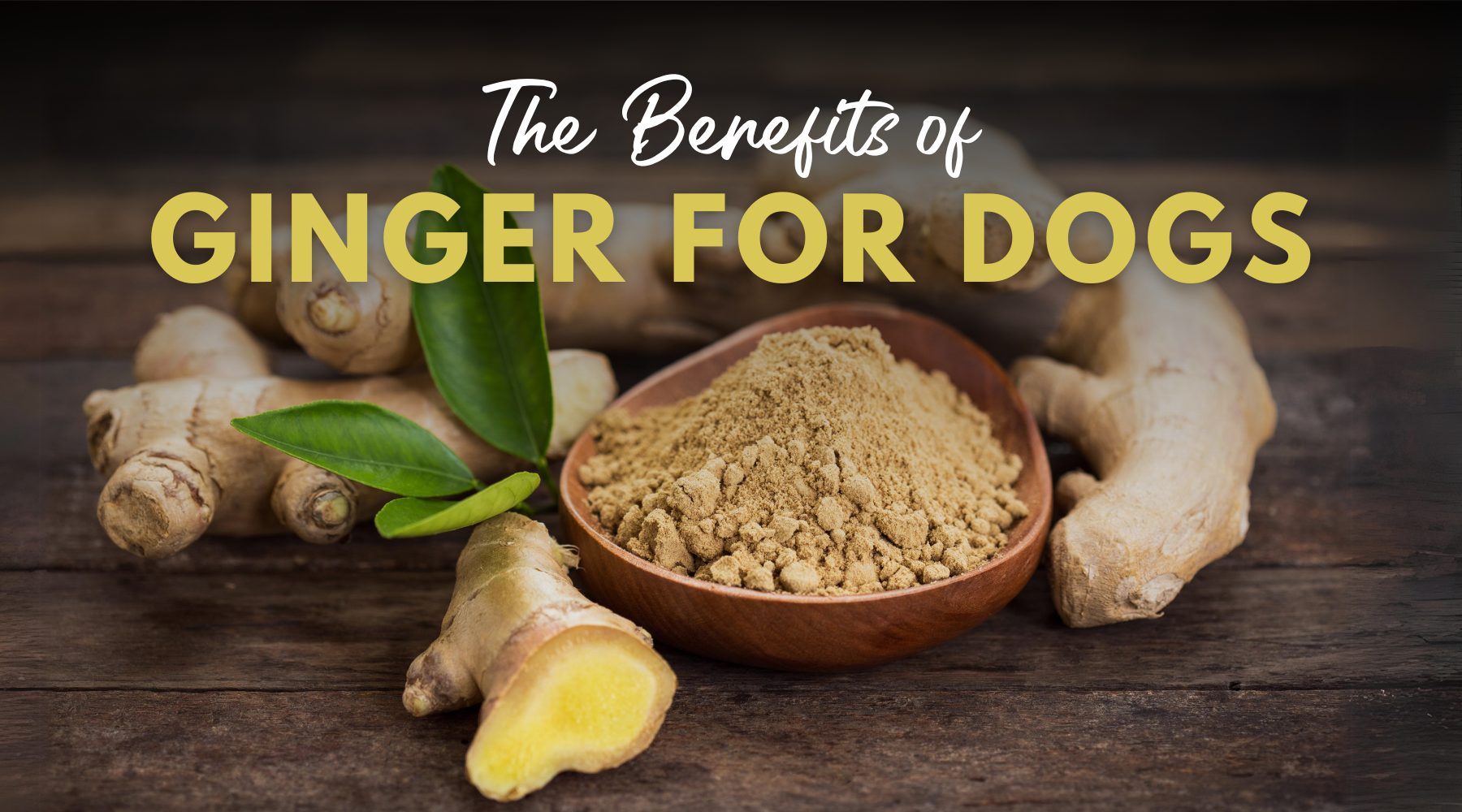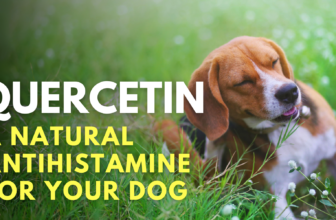
[adinserter block=”3″]
Explore the powerful benefits of fermented ginger in dogs and people
As dog guardians, our main priority is the health and happiness of our canine family members which greatly depends on their mobility and being pain free.
As we become more aware of the conventional drug side-effects, an increasing number of dog lovers are on the lookout for safe, natural ways to keep their dogs injury, arthritis and inflammation free, and the same applies to recovery from injuries and surgery. Surprisingly, fermented ginger has been gaining attention, especially in the area of digestive health and mobility.
Ginger is a superfood that offers a natural way to ease discomfort, enhance mobility, and support joint health but it also promotes the overall health of the digestive tract, immune system, and skin. However, not all ginger supplements are created equal. The method of preparation of ginger matters, and taking ginger through the process of fermentation significantly increases its bioavailability and potency.
This post is about the scientific basis of how fermented ginger can help your dog.
The Tradition and Science Behind Ginger
Ginger has been used for thousands of years to treat a variety of ailments. From soothing an upset stomach to reducing inflammation, this powerful root has made its way into modern cuisine but also into medicine cabinets.
Ginger contains more than 100 active compounds, but two, in particular, gingerols and shogaols, have caught the attention of scientists. These compounds have anti-inflammatory and antioxidant properties, making them beneficial for humans but also dogs.
Active Ingredients and Research Behind Ginger
The study titled “Effect of Ginger on Inflammatory Diseases [1] published in “Molecules” in November 2022 reviews the therapeutic potential of ginger against common inflammatory diseases such as ulcerative colitis, Crohn’s disease, rheumatoid arthritis, psoriasis, and lupus erythematosus.
The bioactive compounds in ginger, particularly 6-shoagol, zingerone, and 8-shoagol, have been identified for their antioxidant and anti-inflammatory properties, which can significantly improve the quality of life for patients suffering from these conditions.
How Does Ginger Work?
Ginger’s effectiveness against inflammatory diseases is attributed to its ability to modulate immune responses and reduce inflammation through various mechanisms.
For example, in rheumatoid arthritis, ginger compounds have shown promising results in reducing symptoms by inhibiting inflammatory cytokines and pathways.
Similarly, in the context of inflammatory bowel disease, ginger has demonstrated the ability to modulate gut microbiota and inflammatory responses, contributing to symptom relief.
For systemic lupus erythematosus, 6-gingerol has shown a protective effect by attenuating neutrophil extracellular trap release. In cases of psoriasis, ginger’s ability to decrease NF-κB suggests its potential as an alternative treatment approach.
Additionally, ginger may offer protective effects against cancer and mitigate the side effects of chemotherapy, such as nausea.
Another study from the Journal of Basic Medical Sciences,[2] published in 2022, explores the potential of ginger in managing metabolic syndrome—a cluster of conditions that include high blood sugar, cholesterol, obesity, and hypertension.
This study suggests that ginger gingerol and shogaol in vascular and heart disease, helps weight loss, reduces blood sugar levels and improving cellular energy metabolism.
A randomized, placebo-controlled, and double-blind clinical trial [3] published in *Natural Product Research* in June 2023, researchers explored the long-term effects of a dietary supplement containing Cannabis sativa oil, Boswellia serrata and Zingiber officinale (ginger) on dogs with osteoarthritis (OA) post-physiotherapy treatments.
The study evaluates the supplement’s efficacy in reducing inflammation, oxidative stress, and chronic pain in dogs after ceasing three months of prior physiotherapy.
Over three months, the study observed notable improvements in the treatment group compared to the placebo group, including increased levels of glutathione (GSH) and decreased levels of C-reactive protein (CRP) in the blood. These findings suggest the supplement’s potential in alleviating symptoms associated with osteoarthritis in dogs.
The Role of Fermentation Supplement Quality
When it comes to choosing supplements for our dogs, especially something as powerful as ginger, understanding the process behind their creation is crucial. One method that stands out both for its ancient roots and modern scientific validation is fermentation as a key player in enhancing the potency and bioavailability of supplements, including ginger.
Why Fermentation Matters
Fermentation is a natural process that transforms the basic constituents of food and herbs, increasing their nutritional value and making them more digestible. When applied to ginger containing supplements, fermentation does more than just break down the root into a more palatable form. It amplifies ginger’s beneficial properties, making the active compounds more accessible for your dog’s body to absorb.
Enhanced Bioavailability
The main advantage of fermented ginger supplements lies in their bioavailability. This means that the nutrients in the supplement are more readily absorbed and utilized by your dog’s body, ensuring they receive the full spectrum of benefits. Fermented ginger is easier on the stomach and can be more effective in supporting joint health, reducing inflammation, and aiding in muscle recovery.
Choosing the Right Supplement
Not all ginger containing supplements are created equal. When selecting a ginger supplement for yourself or your dog, opting for a fermented product ensures maximum health benefits.
Here are two examples of fermented mobility and also gut health supplements:
GutSense – pre, probiotic and digestive support
JointButter – advanced joint, arthritis, injury and mobility support
Incorporating Fermented Ginger into Your Dog’s Diet
Integrating fermented supplements containing fermented ginger into your dog’s diet can be a game-changer, especially for those dealing with arthritis, mobility issues, digestive imbalances,
The Bigger Picture
Incorporating fermented ginger into your dog’s diet is just one aspect of achieving better mobility. Proper nutrition, regular exercise, and routine veterinary care are all crucial components of keeping your dog healthy and happy. You can significantly improve their quality of life, helping them enjoy many happy and active years by your side.
References
-
Ballester, P., Cerdá, B., Arcusa, R., Marhuenda, J., Yamedjeu, K., & Zafrilla, P. (2022). Effect of Ginger on Inflammatory Diseases. Molecules, 27(21), 7223.
-
Salaramoli, S., Mehri, S., Yarmohammadi, F., Hashemy, S. I., & Hosseinzadeh, H. (2022). The effects of ginger and its constituents in the prevention of metabolic syndrome: A review. Iranian Journal of Basic Medical Sciences, 25(6), 664–674.
-
Gabriele, V., Bisanzio, D., Riva, A., Meineri, G., Adami, R., & Martello, E. (2023). Long-term effects of a diet supplement containing Cannabis sativa oil and Boswellia serrata in dogs with osteoarthritis following physiotherapy treatments: a randomised, placebo-controlled and double-blind clinical trial. Natural Product Research, 37(11), 1782-1786. DOI: 10.1080/14786419.2022.2119967.
[adinserter block=”3″]
Source link






